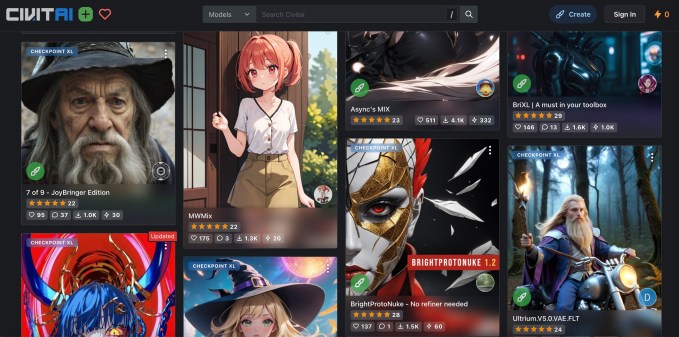AI image generator Stable Diffusion already has a lot of fans, and now those experimenting with the new AI technology to develop their own models have a place to share their work with other enthusiasts. A startup called Civitai — a play on the word Civitas, meaning community — has created a platform where members can post their own Stable Diffusion-based AI image models for others to discover, as well as the output of their work — AI photos — for consumers to browse and enjoy.
Explains Civitai CEO Justin Maier, the idea for the startup came about because he identified there was a need for a place where people could share their models and others could find them. People, he said, would post images they had made but others didn’t know how to duplicate their work to make their own images.
After wrapping up a project at Microsoft, where he had worked as a contractor on web development projects, Maier found himself intrigued by Midjourney.
“It scratched that same itch that web development had where I saw something — or I had something in my mind — and I could type some text in get something back. It became this collaborative experience where I could explore my creativity and I get pulled in directions maybe I hadn’t planned,” he says.
But Maier soon found himself limited by Midjourney’s credits-based plan that ultimately had him waiting for 5 minutes for each image to be generated. That, he says “was a real bummer because I had fallen so deeply in love with this ability to explore and create anything that I could think of,” Maier tells TechCrunch.
Around the same time, an open-source version came out called Stable Diffusion that basically allows you to do the same thing in terms of AI image generation. As the community around Stable Diffusion grew, people were learning how to do different things with the model through prompting or by adding new concepts into the model, like using images of themselves to make AI-generated selfies, for example. Maier started to see people posting their own models that would let you do cool things — like generating in a synth wave style or a punk style — and merging models together to make other new concepts, as well. But these were being posted around the web in places like Reddit or Discord, not in a centralized community.
That led him to create Civitai (or Model Share, as it was originally called), an online community that organized this content in a way where people could come back and find it later.
Techcrunch eventJoin 10k+ tech and VC leaders for growth and connections at Disrupt 2025
Netflix, Box, a16z, ElevenLabs, Wayve, Sequoia Capital, Elad Gil — just some of the 250+ heavy hitters leading 200+ sessions designed to deliver the insights that fuel startup growth and sharpen your edge. Don’t miss the 20th anniversary of TechCrunch, and a chance to learn from the top voices in tech. Grab your ticket before Sept 26 to save up to $668.
Join 10k+ tech and VC leaders for growth and connections at Disrupt 2025
Netflix, Box, a16z, ElevenLabs, Wayve, Sequoia Capital, Elad Gil — just some of the 250+ heavy hitters leading 200+ sessions designed to deliver the insights that fuel startup growth and sharpen your edge. Don’t miss the 20th anniversary of TechCrunch, and a chance to learn from the top voices in tech. Grab your ticket before Sept 26 to save up to $668.
San Francisco | October 27-29, 2025 REGISTER NOWInitially, he seeded Civitai by reaching out to model creators and asking them if they could post their work on the site. At first, there were only around 40 or 50 different models available. But over time, the site began to grow.

“People were thrilled to be seen for this effort that they had made. And so by about January, we had become the go-to place for sharing these things,” says Maier. “There were other sites that people were posting to, like HuggingFace…but it wasn’t image-centric,” he explains. “So we became the de facto standard for sharing your model and various AI resources and the images that you’d made,” Maier adds.
By January 2023, the site hit 100,000 registered users and it occurred to Maier that it could be more than a community project — it could be a company. So the Civitai was then “officially” founded, and three months later, it hit a million registered users. Today, that number is around 3 million registered users and it sees around 12 to 13 million unique visitors each month.
“It’s wildly how quickly it’s grown — definitely bigger than we thought it would be back in January,” Maier says.
Of the 3 million users, only around 10,000 unique creators each month are actually uploading new models. However, that number has risen by approximately 25% over the last month, after Citivai added the ability for people to train new models on the site, which makes it easier to get started. A larger number of users are consuming the models and the content created.

As a result of its growth, Civitai, which is also co-founded by Maxfield Hulker and Briant Diehl, raised a $5.1 million round in June led by Andreessen Horowitz (a16z) at a $20 million valuation. The other participants in the funding were a bit unusual — the legal team that helped them close the round also got on board.
“Civitai is the prime example of a company that’s already built an incredible, engaged community and all without spending a dime on marketing,” said Andreessen Horowitz Partner Brian Kim, in a statement. “Our investment in the company will only supercharge something that’s already working incredibly well, by contributing to a world where any individual can take advantage of what the biggest technological shift of our generation – AI – has to offer.”
To use Civitai, users can upload a series of images that represent the style those images represent, then choose the base model — like the standard model, anime model, or more realistic model, and so on. After about an hour, the new model should be ready and you’ll be able to generate your own images using that style you had captured. The images generated on-site include metadata that detail things like the prompts and resources used, and Civitai encourages those who generate models off-site to do so, too.
There are issues with artists finding out their work has been used to train AI models, which is a concern. To address this, Civitai has created a process that allows artists to flag resources they believe are using their work, which kicks off a negotiation as to the next steps. In some cases, that’s the removal of the resource entirely, or other times, the artist just wants their name removed.
“Ideally what we want to have happen — eventually — is that these artists can…use these styles for themselves. And if they want to give people the ability to create in their style, then they can give people the ability to pay to do that,” says Maier. “But it’s still early days and I haven’t had an opportunity to work with many artists that are interested in doing that,” he admits.
404Media points to another more serious problem Civitai has — it allowed users to post non-consensual porn images, and created a bounties feature for making AI images of certain targets, styles or compositions, paid for in a virtual currency. The company’s policies prohibit non-consensual porn AI images, but don’t limit the use of training AI images on real people. The report indicates that users figured out how to piece together models to then share the non-consensual images off-site. The site’s investigation indicated that it had seen Civitai both enforce the policy and ignore it, at times.
Civitai responded to the report by noting its policy prohibits mature and suggestive content, offers a removal request form and email address, and says it doesn’t allow the use of resources intended to reproduce the likeness of real people with its on-site generator. (The ability to generate real people is available with the foundational Stable Diffusion model, however.) It also noted the “bounties” are not publicly available, but if the resulting images are shared on-site, they have to abide by the existing “real people” policies. Bounties that ask for the likeness of real people represent 10% of requests, it said.
Despite wading into this treacherous area, Maier believes there could be a market for legitimate AI work in the future, which would include the use of AI imagery inside things like movies, music videos, applications, and other creative endeavors. In the near term, though, the plan is to create a consumer-facing mobile app that will work as a repository of the AI imagery, as a sort of companion to the experience happening on the main site.
The company is also now planning to focus on allowing users to monetize their work, whether that’s connecting them with brands that want to create unique concepts using AI, or more direct monetization — like paying to access a model or paying for one-off image generation. For now, though, everything on the site is free to use. (The company uses Cloudflare’s R2 to keep costs down around downloads.)
“I’d like to start working with brands and real people and IP to give them the ability to sell their likeness to people that want to be able to use it, to do advertisements and things like that,” says Maier. “And I think that we can set up licensing in a way and set permissions in a way so that they can really constrain what it can and cannot be used for. I think that that’s going to be critical for as we think about how things evolve in this AI era,” he adds.
Over time, the startup aims to expand to other modalities beyond AI image models, but that’s further down the road, Maier says.
[Updated, 12:10 PM ET with 404Media’s investigation details, and 2:27 PM ET with Civitai’s response.]

